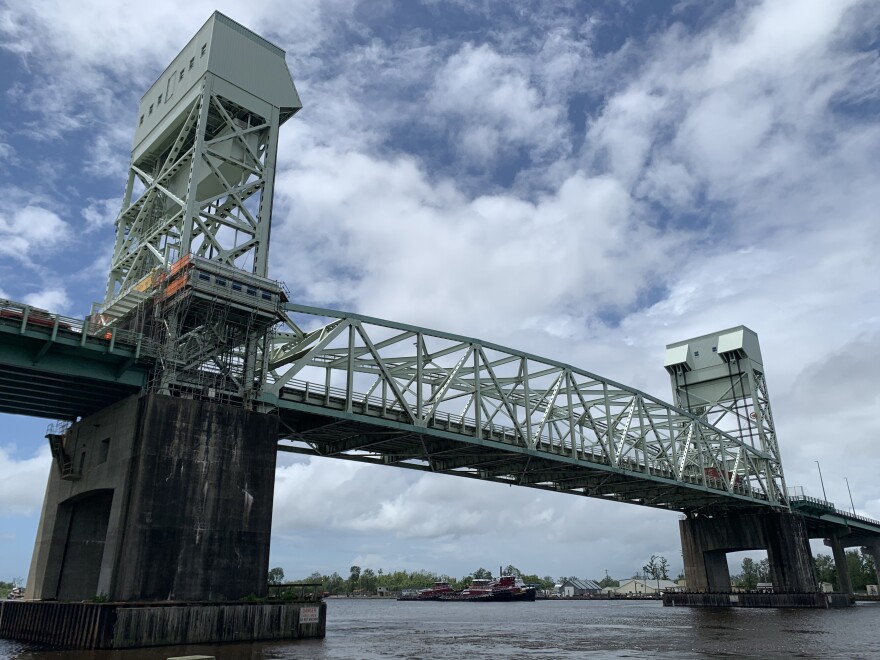The Cape Fear Memorial Bridge is one of Wilmington’s most iconic sights — but it has less than a decade left in its lifespan. While the clock is running out on the 1969 bridge, upkeep costs are also increasing: on top of an annual $500,000 in required maintenance, rehabilitation costs have risen from $5 million last decade to $15 million for more recent work, and those numbers aren't expected to go down.
While plans for a new bridge — in addition to and to the south of the Cape Fear Memorial — died (again) in 2019, plans to replace the iconic main bridge into Wilmington's downtown have been moving forward.
For some time, the North Carolina Department of Transportation has been narrowing down replacement options. These included both fixed and moveable options, and ranged between $200 and $600 million — the most expensive version would include a rail line, as part of the Wilmington rail realignment project. (You can find a helpful breakdown of those options and route paths from Port City Daily, here).
But, last summer, NCDOT acknowledged that funding was a problem. During a virtual conversation hosted by the Historic Wilmington Foundation in July 2020, NCDOT Division 3 Engineer Chad Kimes told stakeholders: “Because of NCDOT cash balances, I’m not sure how much funding will be available in our next round of prioritization […] we will also be talking to other states in the U.S. on how they do similar projects — there may be other funding opportunities out there.”
And, in fact, there is a range of options out there, from federal funding to tolls -- yes, tolls are an option -- as well as public-private partnerships, and even fully privatizing bridges, turning over ownership and toll operation to the private sector.
Other funding options: Federal money? Private investment?
For many transportation departments around the country, funding from gas taxes fell sharply during the pandemic as much of the workforce, either laid off or shifting to remote work, stopped regular commutes. This only put more stress on the nation's roadway infrastructure — but many in the transportation world are hopeful that President Joe Biden and Republican leaders have sealed a $1.2 trillion deal that, while scaled-down compared to Biden's initial proposal, is still the largest plan of its kind in decades. Right now it's unclear which specific projects would qualify, but a main arterial bridge into a metropolitan area with just years left in its operation seems like a good candidate.
Still, it's possible that federal funding won't be available — or won't roll out soon enough to be a part of NCDOT's multi-year planning and funding scheme. Another option then, is private investment, whether as part of a private-public partnership or privatization. But for that to work, there would likely need to be a revenue source to provide a return on investment — and that would probably mean tolls. That would allow a private company to invest in a new bridge in exchange for managing the tolls (essentially, a management contract) or to wholly take on the bridge-and-toll operation as a private entity.
Privatized bridges are a burgeoning industry, with companies like United Bridge Partners (UBP) identifying areas where state and local transportation departments are caught between aging or obsolete infrastructure and cash-flow problems. Take for example the South Norfolk Jordan Bridge in Chesapeake, Virginia, where the local government didn't have the funding to prioritize a new bridge, despite a general consensus that the city needed one. UBP identified a new bridge as a potential for private investment and offered an 'unsolicited proposal' — meaning it was offered outside of a typical formal bid process — to the City, which ultimately approved it.
The project had pros and cons, providing the city with a needed infrastructure improvement it couldn't afford, but cutting local government out of decisions on toll rates and, initially, revenue. After a long fight, the City of Chesapeake did eventually get a small slice of toll revenues (about 3 cents on tolls that ranged from $2 to $4.75). The bridge's owner and the city also fought over property taxes.
On Wednesday, several NCDOT officials will present an ‘unsolicited proposal’ — that is, not part of a bid for proposals — to replace the Cape Fear Memorial bridge at a regional urban planning meeting. While it's not clear what, exactly, the proposal is, given NCDOT’s financial issues, it would be unsurprising if private investment was involved.
Until that meeting, the content of the proposal is being closely guarded. It’s considered confidential under a GS_132-1.2(1) and (9), parts of state law protecting proprietary design work done by private companies. Officials from Wilmington and other local governments said they had not yet seen the proposal -- but expressed interest.
The presentation will be made on Wednesday at 3 p.m. at the Wilmington Urban Area Metropolitan Planning Organization meeting; you can find the agenda here, and watch the meeting using this online link.


